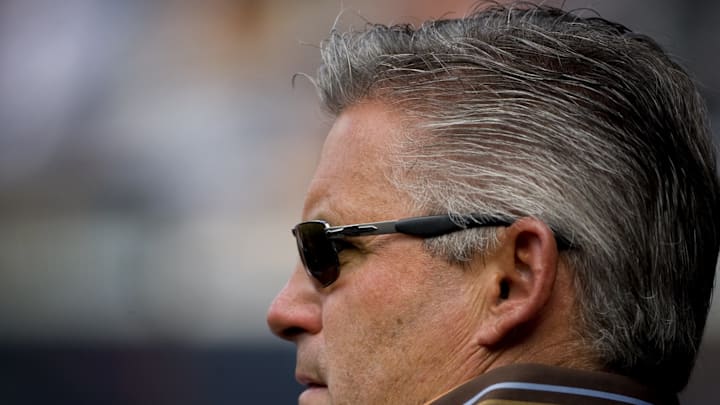
8. Jack McKeon, 1988, +6.4 (12-3-1)
When the Padres finished last in 1980, team owner Ray Kroc dismissed GM Bob Fontaine and elevated his chief assistant, Jack McKeon, to the general managership. That moved launched one of the longest and most successful tenures in the team’s history.
McKeon ran the team through 1990, winning its first pennant in 1984 and achieving the best record (87 wins) to that point in franchise history. By percentage points, he remains the second most successful GM in franchise history at .487.
Although 1984 was McKeon’s championship season, he actually had two better years from the standpoint of impact on team performance. The first of those came in 1988 when, despite McKeon’s best efforts, the Padres still only finished third in the NL West, 11 games behind the Dodgers.
McKeon made four moves of consequence to the Padres, none moreso than his promotion of prized rookie second baseman Roberto Alomar after only nine games at Triple-A Las Vegas. Alomar batted .266 in 611 plate appearances with the Padres, finishing fifth in Rookie of the Year voting and piling up a 2.2 WAA.
McKeon wanted a shortstop with more offensive potential than the veteran incumbent, Garry Templeton. He signed Dickie Thon, coming off a bad 1987 with the Houston Astros, and got a .264 season good for a +1.1 WAA. He also re-signed veteran pitcher Eric Show, who had his best season for the Padres. Show went 16-11 with a 3.26 ERA in 32 starts, pitching 13 complete games. That added up to +1.3 WAA.
To further fortify the pitching staff, McKeon also completed a mid-season trade with the Cincinnati Reds that returned former Padre Dennis Rasmussen to San Diego. With the Reds, Rasmussen had been a liability; a 2-6 record and 5.75 ERA. More comfortable in San Diego, he made 20 starts with a 2.55 ERA and 14-4 record, amounting to a +1.6 WAA.
Only one criticism of McKeon’s 1988 performance is plausible, and that was his caution. He hit on an extraordinarily high 75 percent of his personnel decisions … but he only made 16 of them, an unusually low number. What, it’s fair to wonder, might the 1988 Padres had done if their GM had coupled his judgment with a more frenetic pace of activity?
